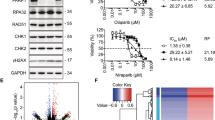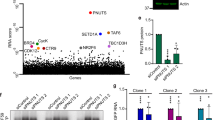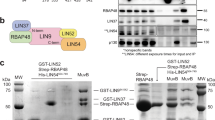Abstract
THE p53 protein is apparently central to the development of human cancers because both alleles are often found to be mutated in different tumour types1. In addition, wild-type p53 can inhibit transformation by viral and cellular oncogenes in vitro, so p53 has been classified as a tumour suppressor2. Investigations of the normal function of p53 have indicated that at least one of its functions could involve the activation of gene expression through the binding of specific DNA-regulatory sequences3,4. Also, overexpression of p53 can mediate growth arrest5 and repress transcription from a variety of promoters6,7. We demonstrate here both in vivo and in vitro that expression of wild-type p53 specifically represses the activity of promoters whose initiation is dependent on the presence of a TAT A box. Promoters whose accurate transcription is directed by a pyrimidine-rich initiator element, however, are immune to the effects of p53. Furthermore, we observe that repression is mediated by an interaction of p53 with basal transcription factor(s). Thus, p53 appears to repress the activity of certain promoters through direct communication with TATA box-dependent basal transcription machinery.
This is a preview of subscription content, access via your institution
Access options
Subscribe to this journal
Receive 51 print issues and online access
$199.00 per year
only $3.90 per issue
Buy this article
- Purchase on Springer Link
- Instant access to full article PDF
Prices may be subject to local taxes which are calculated during checkout
Similar content being viewed by others
References
Hollstein, M., Sidransky, D., Vogelstein, B. & Harris, C. C. Science 253, 49–53 (1991).
Finlay, C. A., Hinds, P. W. & Levine, A. J. Cell 57, 1083–1093 (1989).
Zambetti, G. P., Bargonetti, J., Walker, K., Prives, C. & Levine, A. J. Genes Dev. 6, 1143–1152 (1992).
Farmer, G. et al. Nature 358, 83–86 (1992).
Baker, S. J., Markowitz, K., Fearon, E. R., Willson, J. K. V. & Vogelstein, B. Science 249, 912–915 (1990).
Ginsberg, D., Mechta, F., Yaniv, M. & Oren, M. Proc. natn. Acad. Sci. U.S.A. 88, 9979–9983 (1991).
Lechner, M. S. et al. EMBO J. 11, 3045–3052 (1992).
Chin, K.-V., Ueda, K., Pastan, I. & Gottesman, M. M. Science 255, 459–462 (1992).
O'Shea-Greenfield, A. & Smale, S. T. J. biol. Chem. 267, 1391–1402 (1992).
Ptashne, M. Science 335, 683–698 (1988).
Pugh, B. F. & Tjian, R. Genes Dev. 5, 1935–1945 (1991).
Pugh, B. F. & Tjian, R. Cell 61, 1187–1197 (1990).
Inostroza, J. A., Mermelstein, F. H., Ha, I., Lane, W. S. & Reinberg, D. Cell 70, 477–489 (1992).
Meisterernst, M. & Roeder, R. G. Cell 67, 557–567 (1991).
Meisterernst, M., Roy, A. L., Lieu, H. M. & Roeder, R. G. Cell 66, 981–993 (1991).
Seto, E. et al. Proc. natn. Acad Sci. U.S.A. 89, 12028–12032 (1992).
Parvin, J. D., Timmers, H. T. M. & Sharp, P. A. Cell 68, 1135–1144 (1992).
Maltzman, W. & Czyzyk, L. Molec. cell. Biol. 4, 1689–1694 (1984).
Kastan, M. B., Onyekwere, O., Sidransky, D., Vogelstein, B. & Craig, R. W. Cancer Res. 51, 6304–6311 (1991).
Martinez, J., Georgoff, I., Martinez, J. & Levine, A. J. Genes Dev. 5, 151–159 (1991).
Nichols, A. F. & Sancar, A. Nucleic Acids Res. 20, 2441–2446 (1992).
Scheffner, M., Münger, K., Byrne, J. C. & Howley, P. M. Proc. natn. Acad. Sci. U.S.A. 88, 5523–5527 (1991).
Morris, G. F. & Mathews, M. B. J. Virol. 65, 6397–6406 (1991).
Gorman, C. in DNA Cloning (ed., Glover, D. M.) Vol. II, 143–159 (IRL. Oxford, 1985).
Gorman, C., Moffat, L. F. & Howard, B. Molec. cell. Biol. 2, 1044–1051 (1982).
Westin, G., Gerster, T., Müller, M. M., Schaffner, G. & Schaffner, G. & Schaffner, W. Nucleic Acids Res. 15, 6787–6798 (1987).
Author information
Authors and Affiliations
Rights and permissions
About this article
Cite this article
Mack, D., Vartikar, J., Pipas, J. et al. Specific repression of TATA-mediated but not initiator-mediated transcription by wild-type p53. Nature 363, 281–283 (1993). https://doi.org/10.1038/363281a0
Received:
Accepted:
Issue Date:
DOI: https://doi.org/10.1038/363281a0
This article is cited by
-
Census and evaluation of p53 target genes
Oncogene (2017)
-
The MDM2–p53 pathway: multiple roles in kidney development
Pediatric Nephrology (2014)
-
Expression of cyclin D2, P53, Rb and ATM cell cycle genes in brain tumors
Medical Oncology (2011)
-
The transcriptional activity of HERV-I LTR is negatively regulated by its cis-elements and wild type p53 tumor suppressor protein
Journal of Biomedical Science (2007)
-
Adenovirus-mediated p53 tumor suppressor gene therapy of osteosarcoma
Laboratory Investigation (2006)
Comments
By submitting a comment you agree to abide by our Terms and Community Guidelines. If you find something abusive or that does not comply with our terms or guidelines please flag it as inappropriate.



